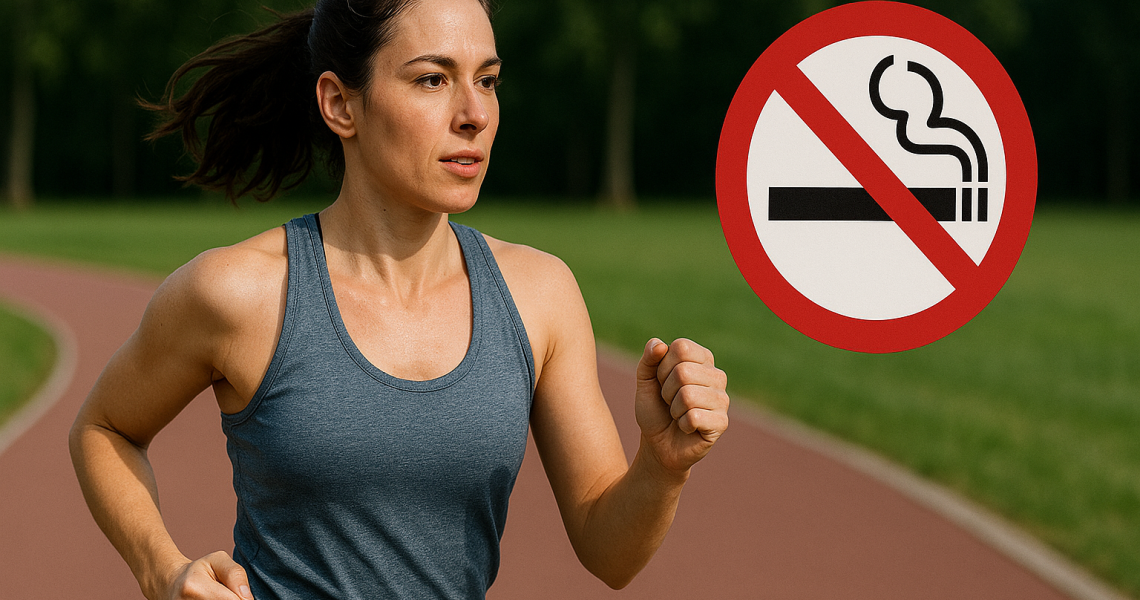Why is sport an essential part of smoking cessation? Many smokers fear that they will put on weight when they stop smoking. But weight gain is not inevitable. By understanding the physiological mechanisms involved in smoking, you can adopt the right strategies to keep your weight stable. Among these, physical activity plays a key role in regulating metabolism and overall well-being. Let’s find out how sport can help you quit without gaining weight, and how anti-smoking lasers can complement this approach.
Why do people stop smoking and gain weight?
The impact of nicotine on metabolism
Cigarette smoking stimulates the metabolism by increasing resting energy expenditure. When a smoker stops, this expenditure decreases, which can lead to weight gain if physical activity and diet are not adapted. Metabolism, previously accelerated by nicotine, gradually slows down, which can affect energy levels and prompt an increase in calorie consumption. The data show that young smokers are particularly sensitive to these metabolic effects, underlining the importance of raising awareness of prevention from an early age.
Effects on appetite and sugar cravings
Nicotine acts as an appetite suppressant by increasing the release of dopamine and serotonin, two neurotransmitters that regulate appetite. After smoking cessation, some smokers feel hungrier and compensate by eating high-calorie foods. This emerging food dependency can accentuate weight gain, particularly if meals are not balanced. In addition, the risk of excessive sugar consumption is high, which can impair physical performance and aggravate other health problems, such as diabetes.
Psychological and behavioral compensation
Smoking is part of everyday life. When they stop, many ex-smokers replace this gesture with another, often linked to meals. Eating becomes a refuge to compensate for the absence of cigarettes. This phenomenon is even more pronounced among sportsmen and women who, used to regular activity, have to manage their addiction without unbalancing their diet. Certain products are then adopted to calm the craving, but they do not replace the effects of nicotine. In the long term, this behavior can increase the risk of uncontrolled weight gain.
The benefits of sport after smoking cessation
Helping to boost metabolism
Sporting activity increases caloric expenditure and compensates for the drop in metabolism due to nicotine withdrawal. What’s more, physical effort promotes fat burning and limits fat storage. Scientific data confirms that sport improves the body’s oxygenation and reduces the risks associated with smoking, notably the risk of premature death. For young sportsmen and women, maintaining a regular level of activity right from the start of cessation helps to improve the transition to a cigarette-free life.
A natural regulator of stress and compulsions
Smoking cessation can generate stress, which encourages snacking. Sport releases endorphins, the feel-good hormones, reducing stress and impulsive eating. This mechanism is essential for smokers who experience cravings linked to addiction. With regular physical effort, the brain adapts and the effects of smoking gradually diminish. Sport is therefore an excellent way of limiting the risk of relapse.
Muscular strengthening to prevent fat storage
Muscle strengthening helps maintain optimal muscle mass and prevent excessive weight gain. The more muscles a sportsman has, the more calories his body burns, even at rest. At a professional level, performance can be affected by nicotine dependence, but regular practice of an adapted sport helps to rebalance the body and reduce the risk of regaining weight after quitting smoking.
What sports can I do to avoid putting on weight after quitting smoking?

Cardio activities (running, cycling, swimming, brisk walking)
Endurance sports are particularly effective for burning calories and promoting fat elimination. What’s more, they improve cardiovascular fitness and increase oxygenation. For young smokers in the weaning phase, adopting an endurance sport helps to rebuild a more efficient respiratory system, thus reducing the harmful effects of cigarettes over the long term.
Muscular strengthening
Weight training and resistance exercises help preserve and develop muscle mass. Good muscle tone increases resting energy expenditure and improves sporting performance. This type of training is particularly recommended for athletes wishing to avoid weight gain while improving their physical condition.
Yoga and relaxation
Yoga, meditation and breathing techniques help to better manage stress, reduce compulsive cravings for cigarettes and food, and improve emotional balance. These practices are essential in preventing the risks associated with quitting smoking, particularly among young people with a strong addiction.
The role of the anti-smoking laser in weight-loss cessation
A tool that regulates appetite and reduces the desire to snack
The anti-smoking laser acts on specific acupuncture points to regulate appetite and limit excessive food consumption, thus preventing compensatory weight gain. By reducing the effects of dependency, it enables more stable and effective weaning.
Support to reduce stress and promote hormonal balance
Stress is a key factor in weight gain after smoking cessation. The anti-smoking laser helps to balance stress hormones and alleviate withdrawal-related tension. High-level athletes in particular benefit from this treatment, as it enables them to maintain their performance while reducing their nicotine dependency.
How anti-smoking laser complements the benefits of sport
Combined with regular physical activity, the anti-smoking laser maximizes the chances of successful withdrawal by limiting the risks of weight gain and dietary compensation. This comprehensive approach makes it possible to quit smoking calmly, without frustration.
Conclusion
Quitting smoking doesn’t necessarily mean putting on weight. By adopting a suitable sports routine, it is possible to offset the metabolic effects of withdrawal and prevent cravings for food compensation. Sport then becomes a real ally, not only for the figure, but also for general health. Combined with the anti-smoking laser, which regulates appetite and limits stress, it offers an effective and lasting solution for frustration-free smoking cessation. It is essential to consult a doctor or health professional to adapt diet and exercise to individual needs.
